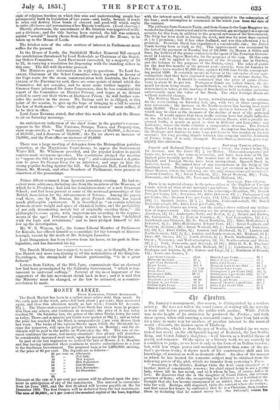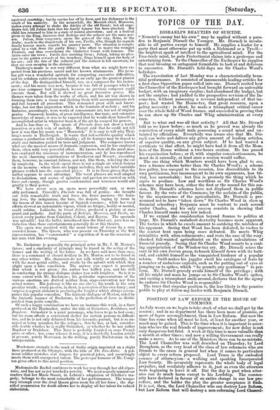lr 'gratrtg.
Mr. Lumley's management, this season, is distinguished by a restless activity. He does not follow the usual course of waiting till one novelty Mr. Lumley's management, this season, is distinguished by a restless activity. He does not follow the usual course of waiting till one novelty is worn out before presenting the public with another. While Facile was in the height of its attraction he produced the Prodigo ; and both these operas, when still running a successful course, have been laid aside for a time to make way for another, of peculiar interest to the musical world—Florinda, the maiden opera of Thalberg. The libretto, which is from the pen of Scribe, is founded (as we men- tioned last week) on the old Spanish legend of Roderick, the last Gothic King, and Count Julian's daughter,—well known as a fruitful theme of poetry and romance. Of the opera as a literary work we are scarcely in a condition to judge, as we have it only in the form of an Italian version ; but, with less tragic power and sustained interest than some of the au- thor's previous works, it shows much of his constructive skill and his knowledge of musical as well as dramatic effect. An idea of the manlier in which he has treated his romantic subject may be obtained from the following précis of the plot, which we transfer from yesterday's Times. " According to the libretto, Rodrigo visits the Arab camp disguised as a brother Arab of considerable renown ; his chief object being to ace aJ'ourg lady, whose life he has saved, and will whom he has, of course, fallen in love. He discovers that she is the daughter of Count Julian, the veteran governor of Setta ; while she, recognizing her deliverer, is so horrified at the thought that she has become enamoured of an infidel, that she resolves to take the veil. Rodrigo, still disguised, visits the convent where she resides ; and first raises her hopes by confessing that he is a Christian, then crushes them by declaring that he cannot marry her. Sine virtuously waste bin equivocal courtship ibut be carries her off by force, and her dishonour is the result of his audacity. In the meanwhile, the Moorish chief, Munuzza, makes every attempt to shake the fidelity of the old Count; but all expe- dients fail, till Johan finds that his family honour has been attacked. His child has returned to him in a state of mental aberration; and at a festival given to the King, discovers that Rodrigo and the seducer are the same per- son. Julian, from vengeance, opens the gates of the city, Setts, to the Arabs; much to the disquietude of his son, Furls, who, though he regards family honour much, regards his country more. The situation is compli- cated by a visit from the guilty King; who offers to marry the wronged Florinda, and thus overwhelms the vindictive Count with remorse. The Arabs enter the town ; Favila dies resisting them ; Julian, taking no plea- sure in the golden rewards of his treachery, flings himself upon the body of his son ; and the fate of the seduced and the seducer is left uncertain, for they are seen escaping in the distance." Thalberg's music is not very different from what we might have ex- pected from his previous career and his known attainments. His pecu- liar gift was a wonderful aptitude for conquering executive difficulties, and its sedulous cultivation made him at an early age the greatest pianist of the day. He distinguished himself, too, as a composer for his instru- ment; and his music was new, because it was full of passages which no previous composer had imagined, because no previous composer could execute them. But still it showed no great inventive power. His themes were taken from the works of others, and his art was shown in forming them into a tissue and clothing them with accompaniments rich and.full beyond all precedent. This demanded great skill and know- ledge, but not that inspiration which is the fountain of melody ; and his fantasias, accordingly, were works of consummate art, but not of original genius. Possessed, besides, of great intelligence, fine taste, and extensive knowledge of music, it was to be expected that he would show himself an accomplished artist in whatever branch of the art he essayed his powers. And he has done so. The music of Florinda does not show a fertile .invention or a rich vein of melody. Mozart said that he could not tell how it was that his music was " Mozartish." It is easy to tell why Thal- berg's music is Thalbergish. It wants that indescribable quality which stamps a production with individuality ; all its features may be traced to study and imitation guided by taste and judgment. The composer knows what are the musical means of dramatic expression, and he has employed them, often with very powerful effect. He knows how all the great mas- ters employed the resources of instrumentation, and he has reproduced the most charming combinations of Beethoven and Mozart ; executing them, however, in constant fulness, and not, like them, relieving the ear by simplicity. In the whole opera there is not a single air which fastens on the memory : where there are happy melodies, they are brief cantabile phrases worked into the concerted pieces. It is in these pieces that the author appears to most advantage. The vocal phrases are well adapted to declamation, and scenes of agitation and passion are carried on with force and energy, though greater condensation and terseness would add greatly to their power. We have never seen an opera more powerfully cast, or more ably performed. Cruvelli's Florinda was full of genius : she brought out with remarkable truth and force the fierce passions—the burn- ing love, the indignation, the hate, the despair, raging by turns in the bosom of this famed heroine of Spanish romance ; while her vocal efforts showed an indomitable vigour, which no fatigue, bodily or mental, could subdue. Lablache, in Count Julian, produced a picture at once grand and pathetic. And the parts of Rodrigo, Ilfunn=a, and Facile, re- ceived every justice from Calzolari, Coletti, and Reeves. The spectacle was splendid ; but the ballet, introduced into the third act, gave less sa- tisfaction than these entertainments generally do at this theatre.
The opera was received with the usual tokens of favour by a very crowded house. The Queen, who was present on Thursday at the first representation, has " commanded " a repetition of it on the occasion of her state visit this evening.



























 Previous page
Previous page